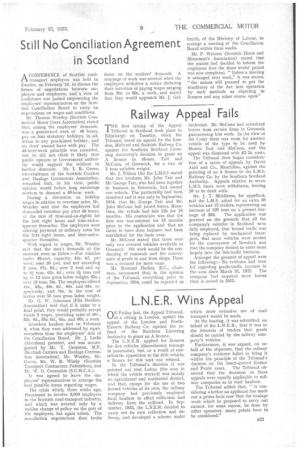Still No Conciliation Agreement in Scotland
Page 39

If you've noticed an error in this article please click here to report it so we can fix it.
PIA CONFERENCE of Scottish roadtransport employers was held in Dundee, on February '10, to discuss the future of negotiations between employers and employees, and a vote of confidence I'.as passed empowering the employers' representatives on the Scottish Conciliation Board to carry on negotiations on wages and conditions.
Mr. Thomas Worsley (Scottish Commercial Motor Users Association) stated that, among the employees' -demands, was a guaranteed week of 48 hours, pay on four statutory holidays, in addition to any proclaimed holiday, and six clays' annual leave with pay. The 48-hour-week principle was conceded, but he did not think it likely that public opinion or Government authority Would support the workers in further demands. . Mr. I. R. Grove, vice-chairman of the Scottish Carriers and Haulage Contractors 'Association, remarked that, in his view, public opinion would before long encourage workers to demand a 40-hour week.
During a discussion on holiday wages in relation to overtime rates, Mr. Worsley said that the employees had demanded overtime pay after 48 hours, at the rate of time-and-an-eighth for the first eight hours and time-and-aquarter thereafter. The employers were offering payment at ordinary rates for the first eight hours, and time-and-aquarter thereafter.
With regard to wages, Mr. Worsley said that the men's demands at the moment were as follow :—For vehicles under 36-cwt. capacity, 52s. 6d. per week; over 30 cwt. and not exceeding 2 tons, 57s. 6d.; over 2 ton § and up to 8 tons, 62s. 6d.; over 3f tons and up to 12 tons gross laden weight, 65s.; over 12 tons, 705. The employers offered 45s., 52s., 56s. 6d., 60s. and 65s. respectively, and 70s. in the case of lorries over 15 tons gross laden weight.
Mr. G. W. Adamson (Fife Hauliers Association) said that if it came to a final point, they would probably accept Grade 2 wages, providing rates of 49s., 53s. 6d., 58s. 6d., 61s. and 66s. a week.
Aberdeen hauliers met on February 9, when they were addressed by representatives from the employers' side of the Conciliation Board. Mr. J. Leslie (Aberdeen) presided, and was accompanied by Mr. T. Ormiston, M.P. (Scottish Carriers and Haulage Contractors Association), Mr. Worsley, Mr. Grove, Mr. W. R. Wisely (Scottish Transport Contractors Federation), and Mr. W. D. Connochie (S.C.H.C.A.).
It was agreed to leave the employers' representatives to arrange the best possible terms regarding wages.
The crisis which, three weeks ago, threatened to involve 8,000 employees in the Scottish road-transport industry, and which was averted only by a sudden change of policy on the part of the employers, has again arisen. The conciliation negotiations then broke down on the workers' demands. A stoppage of work was averted when the employers withdrew a notice declaring their intention of paying wages ranging from 30s. to 60s. a week, and stated that they would approach Mr. J. Gal braith, of the Ministry of Labour, to arrange a meeting of the Conciliation Board within three weeks.
Mr. P. Webster (Scottish Horse and Motormen's Association) stated that the unions had decided to inform the employers that the three weeks' period was now completed. "Unless a meeting is arranged next week," it was stated, "the unions will proceed to put the machinery of the Act into operation by such methods as objecting to licences and any other course open."




























































































